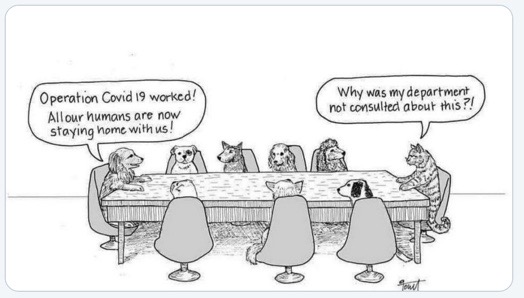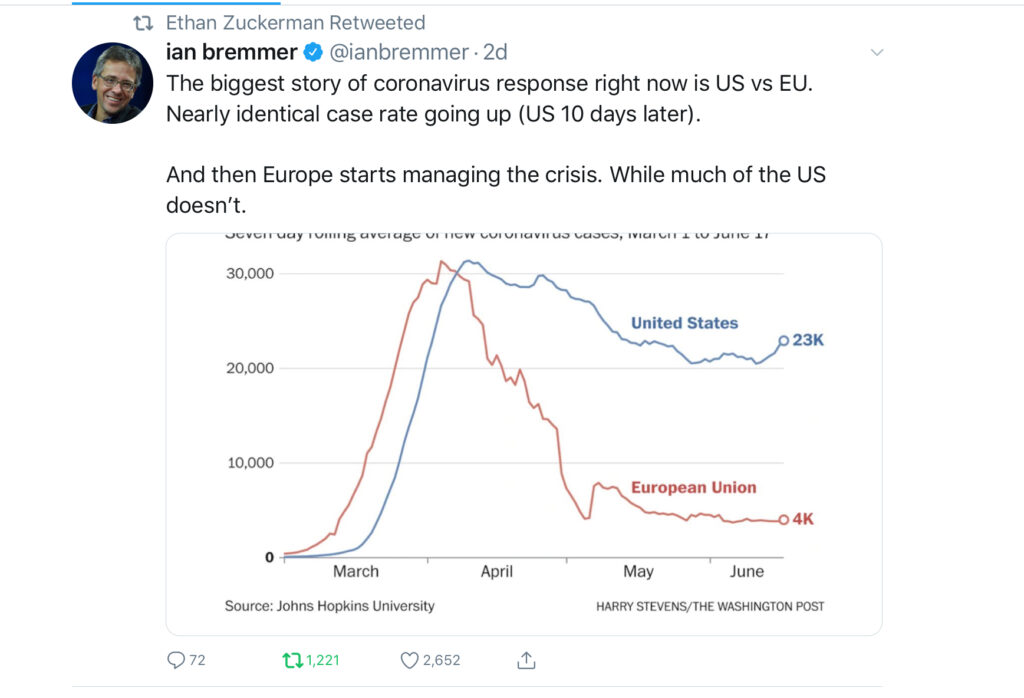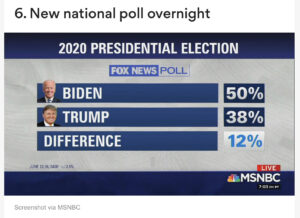Quote of the day
“Those who choose the lesser evil forget quickly that they chose evil”
- Hannah Arendt
I love this cartoon.
Snap-Back and Gone-Forever Goods: Understanding the COVID Recession’s Economic Winners and Losers
Interesting post by Bruce Wydick:
My main contribution here is to categorize different types of goods and services in ways that will help us better understand the economic situation we are in. I will do it across two dimensions. First is the distinction between purchases of what I’ll call “Snap-Back” goods and services and those that are “Gone Forever.” In the Snap-Back category are things that we couldn’t buy during the heaviest COVID lock-down period, but these purchases were simply delayed. There is good reason to think that as the economy begins to open up, purchases of these items might even be higher than normal due to pent-up demand. Even during COVID, things like household appliances break or need fixing, and because over the long run purchases tend to even out, buying less now means buying more later.
“Gone Forever” goods and services, in contrast, are just like the term suggests: gone forever. Like me, you may have foregone several haircuts during shelter-in-place because you didn’t want to get (or give) coronavirus to your barber. But when it becomes safe to go back to the barber chair, you’ll still only get one haircut. The rest of your haircuts disappeared into the economic ether; they were (mutually beneficial) transactions that COVID—what we might call the “invisible anti-hand”—prevented from happening.
Coronavirus, the British State and Brexit
Guest post on the CSaP blog by Philip Rycroft, formerly Permanent Secretary of the Department for Exiting the EU:
Through the rest of 2020 and well into 2021, the British state will have to deal with the conjunction of two seismic shocks.
For one it ought to be well prepared. Officials and ministers have laboured hard since the 2016 referendum to get the country ready for Brexit. Once uncertain, the manner of our leaving the single market and custom union has narrowed to two options, both at the hard end of any previously imagined Brexit scenario; departure with a thin free trade agreement or departure with no trade deal at all. One would likely be more chaotic than the other, but both require immense adjustment to the apparatus of the state, not least the creation of a new trade border with our major trading partner and the re-homing of all of the appurtenances of the EU bureaucracy.
For the other, it transpires, the country was ill-prepared. The state has scrambled to piece together a response to the coronavirus crisis through a fog of confusing data and uncertain science. A formal judgement on how well, or otherwise, the state has coped, both in its own terms and in comparison to other countries, will have to wait for the inevitable enquiry. For now, what is evident is that the tail of consequences from the original outbreak will be with us into next year and well beyond.
On top of these shocks, Johnson and Cummings propose a third one — ‘fix Whitehall’.
Although there is no blueprint, there are clear indicators as to the way in which Whitehall will be fixed and it is possible to see how the current crisis is reinforcing existing prejudice. Private companies, business leaders and the army have been brought in at various points to shake up or bypass the existing bureaucracy, much as the apparent agility of the ARPA programme is touted as a model for sparking innovation and economic development. Power has been further concentrated in No 10. Metro-mayors, and increasingly the devolved governments, have been left on the sidelines. Will these responses be a guide to future action on fixing Whitehall?
You only have to ask the question to know the answer.
Pixar’s computer graphics pioneers have won the $1 million Turing Award
Two men who invented game-changing 3D computer graphics techniques now widely used in the film industry have won the highest distinction in computer science: the Turing Award. If you enjoyed Toy Story, The Lord of the Rings, Finding Nemo, Titanic, Avatar, or Jurassic Park, you have them to thank.
Who are they? Edwin Catmull and Patrick Hanrahan. Catmull cofounded Pixar and hired biophysics PhD Hanrahan as one of the first employees in 1986. Hanrahan spent much of his time modeling materials and lighting to help animations look closer to real life. “Physicists generally don’t study hair or skin, and why they look the way they do. I did, and spent years thinking about how to get things like lighting right,” he told MIT Technology Review.
The most interesting aspect of this (for me, anyway) is that way back in 1970, Catmull was part of the University of Utah’s ARPA program, where he came up with the first method to display curved surfaces on a computer. Up to that point, computer-generated images were all straight lines and polygons. While at Utah in 1972, Catmull created a short film called “A Computer Animated Hand,” which is one of the earliest examples of computer animation.
It took a long time for the industry to fully wake up to the potential of what he’d invented. The world’s first computer-animated feature film, Pixar’s Toy Story, didn’t come out until over two decades later, in 1995.
This is an instructive case study in how government-funded research can underpin great commercial developments. The Utah Lab where Catmull worked was funded by ARPA.
This blog is also available as a daily email. If you think this might suit you better, why not subscribe? One email a day, delivered to your inbox at 7am UK time. It’s free, and there’s a one-click unsubscribe if you decide that your inbox is full enough already!










